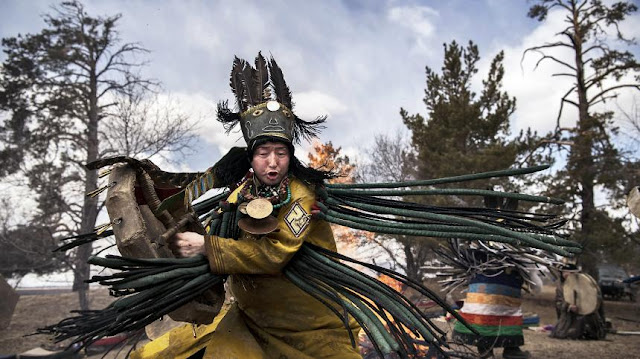In this post, we’ll introduce the top 9 Tibet’s unsolved mysteries for you, including Tibetan yeti stories, red snow in Himalaya, rainbow body phenomenon, Mount Everest flag cloud, Zhang Zhung culture, King Gesar storyteller, Guge Kingdom, gterma mystery, Shambhala and shaman of Tibet.
As one of the world’s greatest unsolved mysteries, the abominable snowman of the Himalayas (Tibetan Yeti) has been always a hot topic among adventurers and explorers to tour Tibet. As early as 1784, the Tibetan abominable snowman has been mentioned in the written records for the first time.
It’s reported that several people in the Himalayan region have witnessed Tibetan Yeti walking around and robbing local men for marriage. In recent years, some expedition groups have gone to eastern Tibet for further investigation, but whether the abominable snowman really exists is still a mystery.
The surface of the Himalayas is often decorated with blood red spots. Seeing from a long distance, you would think it as red snow. Those red spots are made up of various algae, such as Chlamydomonas nivalis, Chlorococcum infusionum, Ankistrodesmus and so on. Widely distributed in the permanent ice and snow, the plateau algae have a strong cold resistance, making them alive even at -36℃. And due to red pigment in their bodies, they seem to be blood-like.
Mysteries of the Rainbow body
In Tibet and Central Asia, the Buddhist rainbow body tradition goes back to the 8th century, beginning with the great master Padmasambhava, but 20th and 21st-century documentation shows that this is no myth or legend — practitioners, from the highest lamas to the most humble lay people, have attained rainbow body.
Rainbow body is a mysterious phenomenon in Tibetan monasteries. It’s believed that only the senior Lamas who have made great achievements would pass away into a rainbow and enter the boundless palace at their parinirvana.
Mysterious Flag Cloud over Mount Everest
When it’s sunny, you can see a milky banner-shaped cloud floating on the top of mount Everest. That is called as mount Everest flag cloud, forming by convective clouds. Based on its location and height, we can deduce the wind force of Mt. Everest summit. If the flag cloud flutters upwards, the wind is much lighter, and vice versa. Thus, it gains the reputation as the world’s highest vane.
Terma texts contain Buddhist teachings intended for troubled times as a source of renewed wisdom and blessings. Although there are antecedents in Indian Buddhism–most famously Nagarjuna’s discovery of the Prajnaparamita literature–terma is primarily a Tibetan phenomena.
The Tibetan word, terma, literally means “treasure” and refers to Buddhist (or Bon) scriptures and relics retrieved from the distant past through a process of revelation. There are two principal types of treasures: earth terma, discovered in the Tibetan and Himalayan landscape, and mind terma, discovered in the mind of the terton or “treasure revealer.” The latter should be distinguished with pure visions, or daknang, which appear in the mind of realized masters.
As Buddhist teachings, terma are most frequently traced to the eighth-century tantric master Padmasambhava, also known as Guru Rinpoche (literally “precious teacher”). According to treasure lore, during each of the tantric initiations he conducted, Padmasambhava appointed one of his disciples to reveal the associated set of teachings in a future lifetime. Afterwards, his principal disciple and consort, Yeshe Tsogyal, transcribed and hid these teachings throughout the Tibetan and Himalayan landscape.
Shambhala or Shangri-La is the mythological worldShangri-La has become synonymous with any earthly paradise, particularly a mythical Himalayan utopia – an enduringly happy land, isolated from the world. In the novel, the people who live at Shangri-La are almost immortal, living hundreds of years beyond the normal lifespan and only very slowly aging.
The mysteries of Tibetan Shamans
Tracing back to Tibetan primitive religion, Tibetan ancestors held that deities existed everywhere, like in the heaven, under the earth, in the waters, and all the living beings in the world are subject to those deities. With the development of human society, people had a fantasy of controlling the objective things and natural phenomena.
The violent treatment of shamans by the Buddhist lama has a long history of Tibet and neighboring Mongolia. At one point, shamans were burned at the stake. However, in the mountainous Himalayan terrain, especially in the difficult to reach areas geographically distant from the Buddhist monastic urban centers, shamans were respected and their work revered.
Dana (Donations for our Buddhist research and development)
Do you earnestly cherish our devoted work? Assuming this is the case, we are delighted that you are finding our blog useful and valuable. Would you consider making a donation for our Buddhist research and development?
We need your help to secure the future of scholarly interaction with Buddhism. Since our very first publication of Dharma works and activities in the year 2008, we had been effortlessly providing free distribution of Dharma posts and articles throughout the previous 13 years. We have exceptionally constrained supports and do not receive subsidized or funding from people in general.
Please help us and to develop our Dharma activities that will not only benefit you, but to all Dharma readers on the planet. Please consider showing your support. Your generosity will certainly help us to enhance our work and to accomplish for a better and brighter prospect to come.
Thank you for reading, may you find peace and great bliss. With your support it helps to spread the Buddha’s precious teachings and turning the Dharma wheels in the world.
*Note
I do not own or infringe any copyright of the picture(s).
Picture(s) courtesy and credit to the rightful distributors and or studios.
Picture(s) is/are intended for editorial use only.











